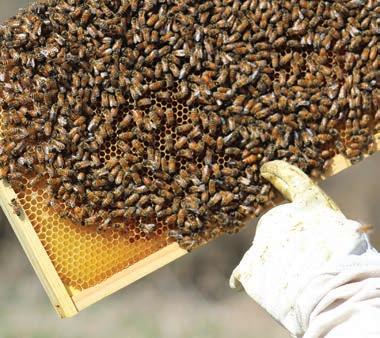
6 minute read
Busy as a Bee
BUSY AS A
Bureau County woman loving her role as a beekeeper
Story and photos by Shannon Serpette
With a full-time job as a speech pathologist, a huge house to keep up, and a small farm to tend to, Angela Bornemann wasn’t looking for a new hobby. But she found one in the form of an apiary, and now she enjoys her queen bee role as a beekeeper.
Both Angela and her husband, Chad, grew up in the Illinois Valley. For 13 years after leaving the area, they lived in Chicago before moving to a 26-acre farm in Peru on the edge of Bureau County five and a half years ago.
“We were ready to settle down and have a more relaxed lifestyle,” she said. “This is our little slice of heaven here.”
Right before the pandemic hit, Angela’s brother, Luke Tomsha, who lives in LaSalle, suggested they begin beekeeping together on her property.
“He’s a lover of nature, as we are,” she said. “That Christmas, he bought me my first beekeeping book, Beekeeping for Dummies,” she said.
Before Tomsha had mentioned beekeeping to Angela, it hadn’t been on her radar.
“I didn’t even think about beekeeping,” she said, adding that she was fascinated by the book once she started reading it. “I couldn’t put it down.”
She learned more about the plight bees are facing and decided she wanted to do her part to help solve a big ecological problem – the decline of the bees.
“It’s a lot to do with the loss of the habitat for the bees,” she said, adding that their decline can also be partially attributed to pesticides and insecticides being used on farms, as well as issues with diseases.
The one obstacle to her plan of becoming a beekeeper was a sizeable one.
“My husband is allergic to bees,” she said.
Despite his allergy, Chad encouraged Angela to follow her dream.
“He loves every aspect of it,” she said. “He knows how much joy it brings me.”
The 10-acre field located near their house was planted with alfalfa, which is a plant that attracts bees.
“We didn’t want to use pesticide or insecticide,” she said. “With alfalfa, you don’t necessarily have to spray it.”
After reading the book and considering all
See BEES page 12
Who’s Who in a Hive
As Angela Bornemann pursued her hobby of beekeeping, she quickly learned about the role each bee plays in its hive. The queen bee: “She is the most important bee in the colony,” she said. The queen is the largest bee in the hive and the only hive member who can lay both fertilized and unfertilized eggs. While queens may have an easier life than worker bees, they’ll live almost entirely in the hive. “The queen only leaves her hive typically twice during her lifetime,” Angela said. One is when she goes on a maiden mating flight where she mates with drones and the only other time she’ll leave the hive is if the colony were to swarm to find a new home. Worker bees: Worker bees are all females, but they can’t reproduce. They do most of the work in any hive, doing tasks such as finding pollen, maintaining the hive, protecting the queen, and raising the young. Most of the bees in a hive are worker bees. Drones: Drones are male bees, and they make up about 10 to 15 percent of the bees in any given hive. “Their only job is to mate with a queen,” Angela said.

Angela Bornemann points to the queen bee in one of her hives. The company she buys bees from offers customers the option to have their queen tagged. That way, she’s easier to spot when they’re checking over their hives.
Angela Bornemann said beekeeping is a passion of hers, and she learns more about it all the time. She’d like to eventually get a glass observation beehive that she can take to area schools to educate children about bees and beekeeping.

Angela Bornemann shows off some of the honey that her bees have produced at her farm, which is located in Peru in Bureau County.
Bees
FROM PAGE 10
factors, Angela decided to try beekeeping.
“The following spring, we bought our first set of packaged bees and started our hive,” she said.
Now she and her brother are in their third year of beekeeping, and they have learned a lot along their journey. Some of it has been from consulting the books they’ve read and reading information from online sources, but another essential resource has been the Illinois Valley Beekeepers Association. With monthly meetings, she’s been able to learn from any mistakes and get through setbacks.
“It’s a great club to be a part of,” she said. “We have met a couple of mentors who have been huge for us.”
While being a beekeeper sounds dangerous to those who don’t do it, if you follow certain precautions, it’s a safe hobby.
So far, she’s not had any significant safety incidents from the estimated 80,000 to 100,000 bees she keeps, although recently, she did skip wearing the proper gloves one day and put on a different pair instead.
“I got stung eight times on my hand – the most ever,” she said. “I had to go get a shot.”
As a beekeeper, she’s run into plenty of challenges.
“Last year, one of our hives was flowing with honey, so many bees were in there. A week later, we went back, and it was empty of honey.”
Confused about what happened, Angela tapped her resources to figure out what went wrong. She quickly found the unexpected answer.
“The hive was robbed,” she said.
Robbing occurs when one colony steals honey from a weaker colony. The robbing bees will go into the weaker hive, take as much as they can, go back to their own colony, let the other bees know about the honey hotspot, and other bees will go to the weaker hive to take honey, too.
At that point, Angela and her brother hadn’t heard of robbing.
“We didn’t even know it was a thing,” she said. “There are ways to prevent that from happening, so you learn from your mistakes.”
They also learned about other hazards along the way, such as overwintering their bees.
Winters can be problematic for beekeepers because so much can go wrong. This past year, she started the winter with four hives – two of them were weak, and two were strong.
“Our mother hive survived, but the other three did not,” she said.
One of the big perks of beekeeping is having access to a lot of delicious honey, and Angela said it was exciting to extract their first batch. They had ten frames of honey when they extracted, which was about 60 pounds and was enough for approximately 70 bottles.
“I sold out of that pretty quickly,” she said. “You’ll see different shades of honey. Ours is light because of the alfalfa.”

Although she can’t take a headcount, Bornemann estimates her hives might house anywhere from 80,000 to 100,000 bees.


The main beehive at Bornemann Farm has lasted over the winters so far, which can be a major milestone for beekeepers.






125BackboneRd.E.,Princeton 815-879-7351
TRY THE CRISPY CHICKEN SANDWICHES






